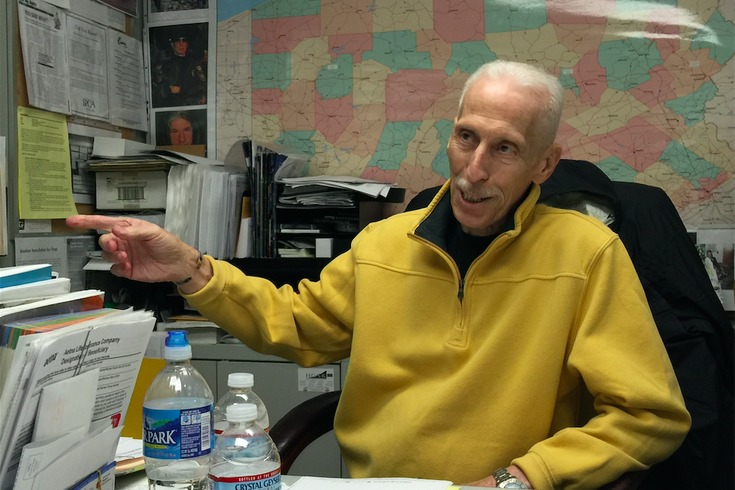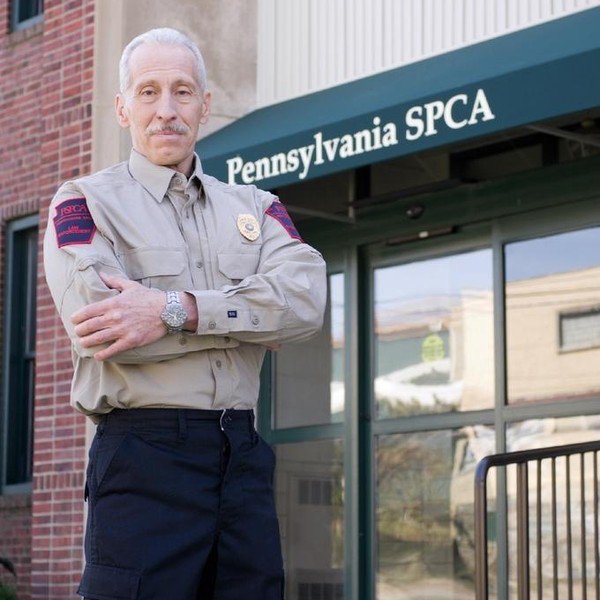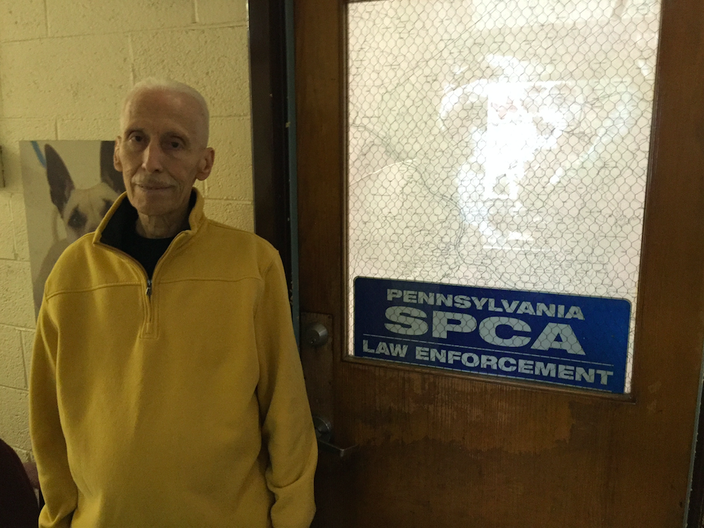
May 19, 2016
 Brian Hickey/PhillyVoice
Brian Hickey/PhillyVoice
George Bengal, director of humane law enforcement for the Pennsylvania Society for the Prevention of Cruelty of Animals.
Twenty years ago, George Bengal found God. Any time now, he knows they’ll finally meet in spirit. That thought brings him peace at these most difficult of times.
George is 69 years old. He won’t turn 70. Doctors diagnosed him in February with Stage IV peritoneal mesothelioma. They said he had just four to eight weeks to live.
Twelve weeks later – through the highs of an outpouring of loving support, the hopefulness and then disappointment of ultimately failed treatments and the lows of a painful, hospice-like existence that’s seen him shed pounds and caretaking capabilities – he faces mortality's inevitability.
Reactions of people who learn that a rare, terminal cancer will soon end their time on Earth can range anywhere from peaceful resignation to stewing in an anger that leaves them tearfully questioning, “Why me?”
George, director of humane law enforcement for the Pennsylvania Society for the Prevention of Cruelty of Animals (PSPCA) for the past two decades, has felt many of them, if even fleetingly.
“There’s really no treatment for it. The tumors are all over my organs, everywhere, in my stomach, my liver. They’re just literally everywhere,” George told PhillyVoice this week, noting he’s undergone two rounds of chemotherapy that, developed just four years ago, has a 30-percent success rate.
“I’m at peace with it. Everybody’s born. Everybody’s going to have a time to die.” – George Bengal, director of humane law enforcement, PSPCA
“I’ve been through that, and obviously, it didn’t do anything to stop the growth of the cancer,” he continued. “I’m at peace with it. Everybody’s born. Everybody’s going to have a time to die."
That stoic, matter-of-factness doesn't always hold firm, though.
When he visited droves of friends and co-workers at the PSPCA’s Erie Avenue hub to celebrate his life’s work two weeks ago, the tears flowed. Scenes captured by the media that assembled just days after George’s diagnosis had been publicly announced were heart-wrenching.
They captured the emotionally raw images of a man who loved – and lived for – his work basically saying goodbye to those who helped him along the way both professionally and personally.
George came to the PSPCA in 2005 after a 22-year career in a variety of Philadelphia Police Department units that included an assignment working with a K-9 bomb-sniffing pooch named Sparky.
When he retired from the force, the man who always had pets while growing up directed his professional energies into his current field.
It’s no exaggeration to say George helped bring humans who abused animals in Philadelphia and 21 other counties to justice.
It’s also no exaggeration to say he helped saved countless animals in the region through his dedicated service.
He helped bring much-needed attention to a donation-reliant law-enforcement agency, as well.
The work of George’s team was the subject of a pair of television shows: "Animal Cops Philadelphia" and the National Geographic program, "Philly Undercover."
After a long career with the Philadelphia Police Department, George Bengal joined the Pennsylvania Society for the Prevention of Cruelty to Animals, where he's established a unique law-enforcement unit that hopes to carry his legacy on after he dies.
As a journalist, I knew that anytime I saw him in the field – like on Halloween 2013 when he recoiled outside the childhood home of Princess Grace Kelly which had turned into a flea-and-feces-riddled scene of squalor – he’d refrain from sensationalism, preferring to let the already-sensational details speak for themselves. (But he'd always have the money quote ready to roll off his tongue, even it if was a similar quote each time.)
Nicole Wilson, a sergeant in the PSPCA’s humane law-enforcement unit, has worked with George since she started at the Women’s Humane Society as an education coordinator some 15 years ago.
Upon learning that Wilson’s father and stepmother were state troopers, he asked her to join his unit. It started with him asking her to shoot photographs on a search warrant he was serving in 2001.
“My second day on the job as an education coordinator, we were outside a residence in Northeast Philadelphia. They found a small basement window that was open and looked around, ‘Oh, who’s going to fit in that window?’ I was like, ‘I’ll go,’” recalled Wilson, in whose wedding George walked. “George said, ‘You’re going to go in, go straight to the door, open it up and we’ll all come in.’
“There are very few people in this world who you can say are irreplaceable. He’s one of those people who is irreplaceable.” – Nicole Wilson, PSPCA human law-enforcement unit
“The woman we were going in on was schizophrenic who had previously starved one dog to death, started to consume it and had another dog that was close to death. So, he said, ‘If anything happens when you get in there, just get to the door, get to the door!’ It was very smooth and easy going, but when we went in, after about 30 seconds, the police immediately left [saying] ‘It stinks in here!’”
That memorable first impression led to a career that saw Wilson talking about her boss and friend in his waning days in the cramped office shared by their team.
“Things are always interesting,” she said of her time working with George. “The great thing about George is you know he’s dedicated to doing the right thing. It is easy to back somebody when you know that their moral center is such that you never have to worry about what they’re asking you to do.”
It’d be easy for peers like Wilson to focus on the depressing reality of the immediate situation. They will be going to their close friend's funeral soon. Yet, they’re “continuing to concentrate on the positives," she said.
She celebrated George’s unique ability to capture the public’s attention. He gets called out in public as “that SPCA guy” in a city that has “trusted him to protect its animals.” It’s an honor and responsibility that he’s taken to heart. It’s actually come to define him.
“George is definitely a man of faith. He is, at this point, putting his life in God’s hands and moving forward,” she said. “The rest of us are doing whatever we can to honor everything that he has taught us. This department was his brainchild. Through sheer will, he’s kept us performing at as high a level as possible. We continue to do our best to make him proud of what we do and to put his name on it.”
She spoke of the great admiration she has for someone who’s able to see the “really bad things” they see in their line of work but treat people who’ve done horrible things to animals with respect. If not for George, the unit may not have gone from being “viewed as dog catchers” into being viewed as 10 full-time law-enforcement officers.
“There are very few people in this world who you can say are irreplaceable. He’s one of those people who is irreplaceable,” she said. “We hope to continue his legacy.”
George Bengal stands outside the PSPCA's human law-enforcement office at the society's Erie Avenue office.
Even now, with limited breath left to take, George would much rather these stories be less about him and more about seeing his works carried forward, about those who’ve helped him, and the animals they’ve helped through the years.
"I can get all the accolades in the world, but when I go to heaven, that will mean nothing, absolutely zero," he said.
At that gathering two weeks past, the shelter announced the start of The George Bengal Fund to End Animal Cruelty. It’s of the utmost importance, seeing donations pour in, since the operation depends on the kindness of strangers – not funding from government – for its very existence. After all, 40 cents of every overall dollar donated to the organization itself goes toward the human law-enforcement effort.
“I don’t fear dying. I don’t like the suffering that leads up to it. Literally, I could go tomorrow, and be very happy with that.” – George Bengal
To George, the work of handling upwards of 10,000 annual calls across their 22-county jurisdiction can continue without him, but not without funding. He said he’s seen many operations go away for lack of financial backing.
“That’s the most important thing. We’ve put a lot of blood, sweat and tears to make the program what it is. This is not about one single person. It’s about carrying the program forward,” he said. “I’ll be gone. We have a lot of capable people here who can step up. I appreciate the outpouring. I never thought that I would have had a following like this. I’d like to see it put to good use. I want to see the public support this program.
“If we were to go away and not do this anymore, there’s nobody to fill the void.”
Looking more introspectively, George said that the cancer has taken his once-active lifestyle away in a mere three months. A CAT scan taken two weeks ago revealed substantial tumor growth.
“Nobody’s got a crystal ball, but it ain’t long,” he said. “Every day, I just feel weaker and weaker. It gets harder and harder to do the normal things: Get up, brush your teeth, get dressed, shower. All that is a challenge now.
“On the days I feel up to it, I try to get in here [to the PSPCA]. It’s better than sitting at home, looking at the four walls, waiting to die. This is my life’s work and I love the work. I get great satisfaction out of what we do. … When I pass, six months, a year from now, people are going to forget. That’s what I don’t want. If what I have, this cancer, my death, can bring about anything good, it’s the continued support for this program.”
Then, he looks back at a life when he wasn’t always prone to religious faith, but after investigating two decades ago, concluded that there is unquestionably a God at work in the universe.
“Everybody has their own belief systems. I am a believer,” he said. “I don’t fear dying. I don’t like the suffering that leads up to it. Literally, I could go tomorrow, and be very happy with that. But there’s a reason for that [suffering] too. God plans your life. He brings people into your life. He orchestrates every aspect.”
He’s asked what it feels like to staring one’s mortality head on, whether there’s a pleading for more time or the freedom to reflect on one’s life and accomplishments.
George Bengal leans toward the latter, to find peace on the precipice of his death.
“Of course, everybody would like to live on a little longer, but God has blessed me,” he said. “I have a great family, great daughters, a great wife, and I had a great career. I look back and I’ve been blessed.
"Would I like to get past this and live a little longer? Sure. But at the end of the day, if this is what God wants for me, then so be it.”
 Photo courtesy/PSPCA
Photo courtesy/PSPCA Brian Hickey/PhillyVoice
Brian Hickey/PhillyVoice